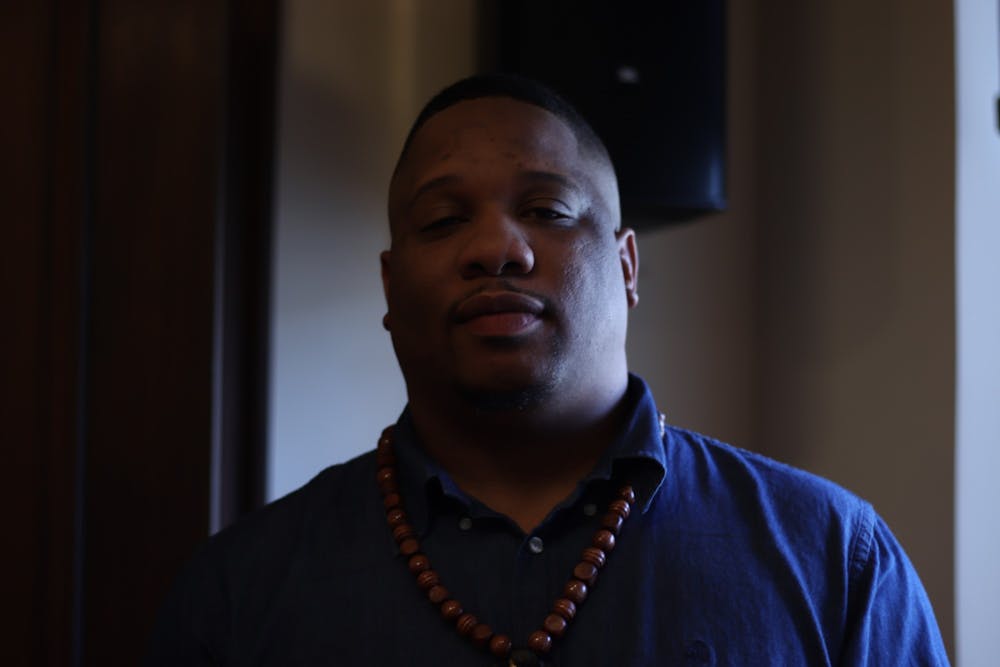Davyon Love, director of public policy at Leaders of a Beautiful Struggle, spoke at the Enoch Pratt Free Library this Saturday. LBS is a grassroots think tank which aims to drive youth leadership development, legislative advocacy and other public policy interests surrounding black people in Baltimore.
Love began his presentation by discussing the origins of Black History Month and its founding father Carter G. Woodson, who also founded The Association for the Study of African American Life and History (ASALH).
ASALH was particularly integral in the early 1900s due to a lack of historical texts. Love quoted Woodson in describing the importance of Black History Month, which was then called Negro Week.
“This is the week set aside by the Association for the Study of Negro Life and History for the purpose of emphasizing what has already been learned about the Negro during the year,“ he said.
Love explained that Woodson’s quote means that this week, or month in the present day, should not be the only time that people learn about black history.
“We should not engage in the undue eulogy of the Negro,“ Love said. “It’s supposed to be the week when you go over all the things that you learned throughout the year and then it should be embedded in every aspect in the concept of education thus delivered to everybody, particularly people of African descent.”
He said that he believes that the way society understands Black History Month does a disservice to black people. He stated that mainstream conversations about black people tend to be narratives of the oppression of black people. He described notions of white supremacy and anti-blackness as a core part of the American consciousness.
“Unfortunately, when there are mainstream conversations about black people, whether it’s about history or whether it’s about a contemporary condition, most of what is rendered in mainstream popular discussions are examples or narrative of black suffering, black oppression, black disadvantage,” Love said. “But there isn’t enough attention put towards the ways in which people of African descent have contributed vitally to the forward flow of human history.”
Love discussed how colonization is not only about subjugating lands, but also involves colonizing information and structuring the way people think about the world. He explained that this legacy of control impacts how black people are seen by others, serving particular political objectives.
Love cited a variety of examples to show how black people are historically rendered. Birth of a Nation (1915), which was screened in the White House, centers around a black man trying to rape a white woman. Love explained that this film was highly celebrated and considered to be a breakthrough in American media enterprise at the time.
“When we think about the white supremacist historiography as a part of the collective American consciousness, it’s important that we understand that what we see today in terms of how black people are rendered have historical antecedents,“ Love said. “There’s things that precede our current involvement today that form our collective consciousness.”
He explained that Black History Month should aim to correct this historiography and the other institutions that support the internalization of black inferiority, such as displaying works of aeronautical developments by black people and studying black intellectual material.
Love talked about how the judicial system in Los Angeles has been called out for referring to cases where the rights of young, black, jobless males are breached as cases with “No Human Involvement.” This, he said, strips the humanity away from black victims.
“These ideas of black people being inherently pathological create a context where the cons of policy are made from the perspective of black people being inherently inferior and create a context within the solution to issues that face black people have to do with increased levels of punishment,” Love said.
Community member Astrid Pierce shared her thoughts on the event.
“My main takeaway is just understanding the fine line between being identified only for victimhood and understanding that you do exist within a system that was built to be subversive,” Astrid Pierce said.
Attendee Wilbert Pierce related Love’s speech to some of his own work on the concept of power in engineering and expressed hope that this would become a more prevalent discussion topic in different cities.
“One of the notions I myself have been looking to is the idea behind the concept and the actuality of power. A lot of commoners have had a lot of great ideas about the notion of power and the reasons why we end up in a lot of internalized violence situations,” he said.
Elizabeth DuVerlie, who is involved with Leaders of a Beautiful Struggle, described the manifestation of Love’s speech for white people.
DuVerlie, who is white, explained that she agreed with Love’s perspective on Black History Month and emphasized the significance of teaching black history, particularly in order to empower black youth.
“The whole anti-black and white supremacy paradigm began to shift as a result of better education about black history and black empowerment,” DuVerlie said.
Love concluded his speech by promoting self-love and self-worth, asserting that these are ideas Black people should internalize.
“We shouldn’t just use Black History Month just as an opportunity to talk about cool black figures, even though that is important,” Love said. “People need to be equipped with the information to challenge the constant notions of black inferiority that show up in public information, in the media and in general society.”





